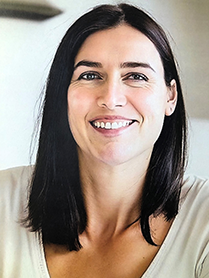
At NCC, it’s important to us to celebrate the achievements of our learners in their educational journey, whether it’s advancing academically, transitioning careers, or simply enjoying the process of learning. We aim to inspire others by showcasing what is possible and by sharing real-life experiences from the journey.
Elaine explains how she has been able to use her online qualifications with NCC to help kick-start her journey towards a career in counselling.
Elaine used her NCC course to help her get into university

“I had children very young, and so I never really went on to further education when I left school. My youngest boy was diagnosed as a child with ADHD, but when he left school we discovered that he was also autistic. I felt somewhat let down by the NHS psychiatrist for missing that diagnosis, as I feel that it would have made a difference to him growing up had we known about his autism diagnosis.
As I was nearing 40, I began to regret that I had not had the opportunity to go on to higher education and make a proper career for myself, and I wanted to be able to work in child mental health to help an already overwhelmed CAMHS to support many needy families. During COVID I was laid off at work, and although I was able to find work thank goodness, it really opened my eyes to the fact that I was in a career where I didn’t matter, I was just a number.
I decided to embark on a home learning course through NCC, and chose to do the two course bundle which covers both counselling skills and mental health. I thought that this would be a good entry qualification into a career within the NHS, however, I quickly learned that it wasn’t going to be that simple. I really enjoyed the course and was amazed at how quickly I managed to complete it. I think because of my personal experience and interest in the topic, that I really found it interesting and so was eager to get back to it in the evenings.
When I achieved my certificate I started looking towards the next steps. This was a knowledge-based qualification, and so would require further study before I would be able to join BACP, although there was the option to sign up with another counselling body ACCPH*. However, what it did provide me with was evidence of my ability to still manage study for university, and when I looked into what I was able to achieve in financial support I realised that university was possible. My course also provided UCAS points, which enabled me to scrape through the minimum requirements for university with my previous A level qualifications. I was really pleased about this because I thought in order to go to university I would be forced to complete a foundation year as a mature student, so using my online learning to demonstrate my ability to research and study was really useful.

I started university this September, and boy is it challenging! However, I am having the time of my life, and although I am so much older than my peers I have been welcomed into the group. I think that now I am getting to the end of my first term, I am proud of what I have achieved. I am now hoping to actually work towards becoming a child psychiatrist, but we’ll see what happens. No matter what, I know I will appreciate what I have accomplished and will enjoy giving something back and helping others.
Thank you to NCC for helping me get started on this journey, and for the excellent tutor support that actually pushed me to put more effort into researching for myself and providing more than I initially thought. I was upset initially when I was getting my assignments referred, but now I completely understand what my tutor was giving me, and I have to say a huge thank you to him for pushing me that bit more.”
How to become a child psychologist
Becoming an NHS (National Health Service) child psychologist in the UK typically involves a combination of education, training, and practical experience. Here is a general guide to help you navigate the path to becoming a child psychologist in the NHS:
1. Educational Requirements:
- Obtain a bachelor’s degree: Start by earning a bachelor’s degree in psychology or a related field. While a specific undergraduate degree in psychology is not always required, it can be advantageous.
- Gain relevant experience: During your undergraduate studies, try to gain experience working with children, adolescents, or families through internships, volunteering, or part-time jobs.
2. Postgraduate Education:
- Complete a master’s degree: Many child psychologists pursue a master’s degree in clinical or educational psychology. This degree provides specialised training in working with children and adolescents.
- Gain practical experience: Master’s programs often include supervised placements or internships, allowing you to gain hands-on experience in a clinical setting.
3. Doctoral Training:
- Pursue a Doctorate in Clinical Psychology: The majority of NHS child psychologists hold a Doctorate in Clinical Psychology. Admission to these programmes is highly competitive. Look for programmes accredited by the British Psychological Society (BPS).
- Gain clinical experience: Doctoral programmes typically include a period of supervised clinical practice. This practical experience is crucial for developing the skills required to work with children and families.
4. Registration and Licensing:
- Register with the Health and Care Professions Council (HCPC): In the UK, practising psychologists, including child psychologists, must be registered with the HCPC. This involves meeting specific educational and training standards.
- Obtain chartered status with the British Psychological Society (BPS): Chartered status with the BPS is also important and may be required for certain positions.
5. Specialise in Child Psychology:
- Choose electives and placements that focus on child and adolescent psychology during your education and training.
- Consider additional training or certifications in specific areas such as play therapy, family therapy, or school psychology.
6. Gain NHS Experience:
- Apply for NHS positions: Look for opportunities to work within the NHS, either through training placements or entry-level positions. This might include working in child and adolescent mental health services (CAMHS) or related departments.
7. Continuous Professional Development (CPD):
- Stay current: Keep abreast of the latest developments in child psychology through continuous professional development activities, workshops, and training.
Remember that the specific requirements and pathways may vary, so it’s important to research the specific requirements of the NHS and any accrediting bodies in your region. Additionally, networking with professionals in the field and seeking guidance from mentors can be valuable throughout your educational and professional journey.
* ACCPH is an independent professional body and registry catering to counsellors, coaches, psychotherapists, and hypnotherapists. While headquartered in the UK, they welcome members and accredit courses from organisations globally.
To ensure credibility, they thoroughly vet professionals before accepting them into the ACCPH membership register. They verify qualifications and require practitioners to provide current Professional Liability Insurance certificates upon joining and annually thereafter.
Their accreditation process adheres to the highest standards, aligning with benchmarks set by Ofqual, the Open & Distance Learning Quality Council, Frameworks for Higher Education, and similar bodies. This commitment to transparency, coupled with their comprehensive membership profile database, allows interested parties to make well-informed decisions about therapists or coaches. Their website profiles are intentionally concise, providing essential information to verify qualifications, while practitioners’ websites serve as comprehensive resources for additional details on their practices.
For practitioners, ACCPH offers a robust professional platform to transparently market skills, qualifications, websites, blogs, and social media to a targeted audience. This approach ensures a powerful and trustworthy presence in the professional community.
NCC is happy to provide further information or respond to any questions regarding these courses, or any of our courses on our website. Simply email [email protected] to communicate with one of our dedicated sales team, who will be happy to clarify anything that is unclear after reading the course details on our website.
References: About ACCPH, https://www.accph.org.uk/about

At NCC Home Learning we are all about celebrating the success of our students, and a recent email from a learner prompted us here to consider writing this article to demonstrate how you can use your NCC adult care or health and social care course to get you on track to starting a more rewarding career as a nurse within the NHS.
Lisa’s journey into nursing
Lisa joined our community of learners in September 2020 as she embarked upon the Level 3 Diploma in Adult Care RQF regulated qualification.

“I really found the NCC tutor support exceptional, as I struggled initially to know where to start as I was a more mature student returning to education for a change of career. After facing redundancy for the second time, I realised that I needed to leave the retail sector and I decided that I wanted to give something back.
I wanted to become a nurse, but I couldn’t give up work to do that as I had a family to take care of. I took the Adult Care course with NCC and then managed to gain a placement within a care home nearby. It certainly was a challenge initially. I was obviously used to hard work, but the demands and responsibilities on care workers was a lot to take on initially, particularly as I was learning the role.
This unfortunately caused me to not be able to complete the course within the 12 months, but NCC were great, and I was able to purchase an extension and complete my course and gain my official qualification.
Last year I applied for a Trainee Nurse Associate vacancy at my local hospital in Bath, and I am now employed doing what I love. I will have to do a number of different placements within the hospital in order to meet my training needs, but so far, I am really enjoying my new job.
Thank you NCC for helping me get this far!”
What is a Nursing Associate?
Nursing associates collaborate with healthcare support staff and registered nurses to provide care for patients and the public.
In their professional role, nursing associates operate across various nursing domains, including adult, children’s, mental health, and learning disability. The scope of their skills and responsibilities depends on the specific care environment in which they are employed.
The standard working week for this role typically spans 37.5 hours, covering a variety of shifts, including nights, early mornings, evenings, and weekends. As a trainee nursing associate, your remuneration will typically align with band 3 on the Agenda for Change (AFC) pay system, progressing to band 4 upon qualification.
In addition to competitive pay, you’ll enjoy access to a comprehensive pension scheme and health service discounts.
Entry requirements
Embarking on your journey as a nursing associate requires GCSEs graded 9 to 4 (A to C) in both maths and English, or Functional Skills Level 2 in these subjects. Some employers may also seek a level 3 qualification, such as the Level 3 Diploma in Adult Care RQF or the CACHE Level 3 Certificate in Preparing to Work in Adult Social Care RQF (if you don’t have a work placement in the care sector that is willing to mentor you). Demonstrating your ability to pursue a foundation degree level of study and successfully complete the Nursing Associate Apprenticeship programme is essential.
FAQs
Originally, NCC stood for the National Consortium of Further Education (FE) Colleges, bringing together these institutions to optimise educational provision. Regular national meetings convened Colleges and Government agencies, fostering collaboration and facilitating the efficient delivery of training to students. Over a span of more than 25 years, NCC has evolved to specialise in delivering exceptionally high-quality online training. This training is accessible to a diverse range of students, including those who are self-funded, sponsored by schools, employers, or training providers.
Online learning enables you to access course materials and study from anywhere in the world and at any time that suits you. Some of our courses have been customised with a reputable Awarding Organisation to provide evidence of knowledge in a particular area where there might not be a formal qualification available. Or alternatively we have a large number of ofqual regulated courses that you can access from the comfort of your own home. Once completed you are usually certificated within approximately 6 weeks subject to moderation.
Online learning enables you to access course materials and study from anywhere in the world and at any time that suits you. Some of our courses have been customised with a reputable Awarding Organisation to provide evidence of knowledge in a particular area where there might not be a formal qualification available. Or alternatively we have a large number of ofqual regulated courses that you can access from the comfort of your own home. Once completed you are usually certificated within approximately 6 weeks subject to moderation.
